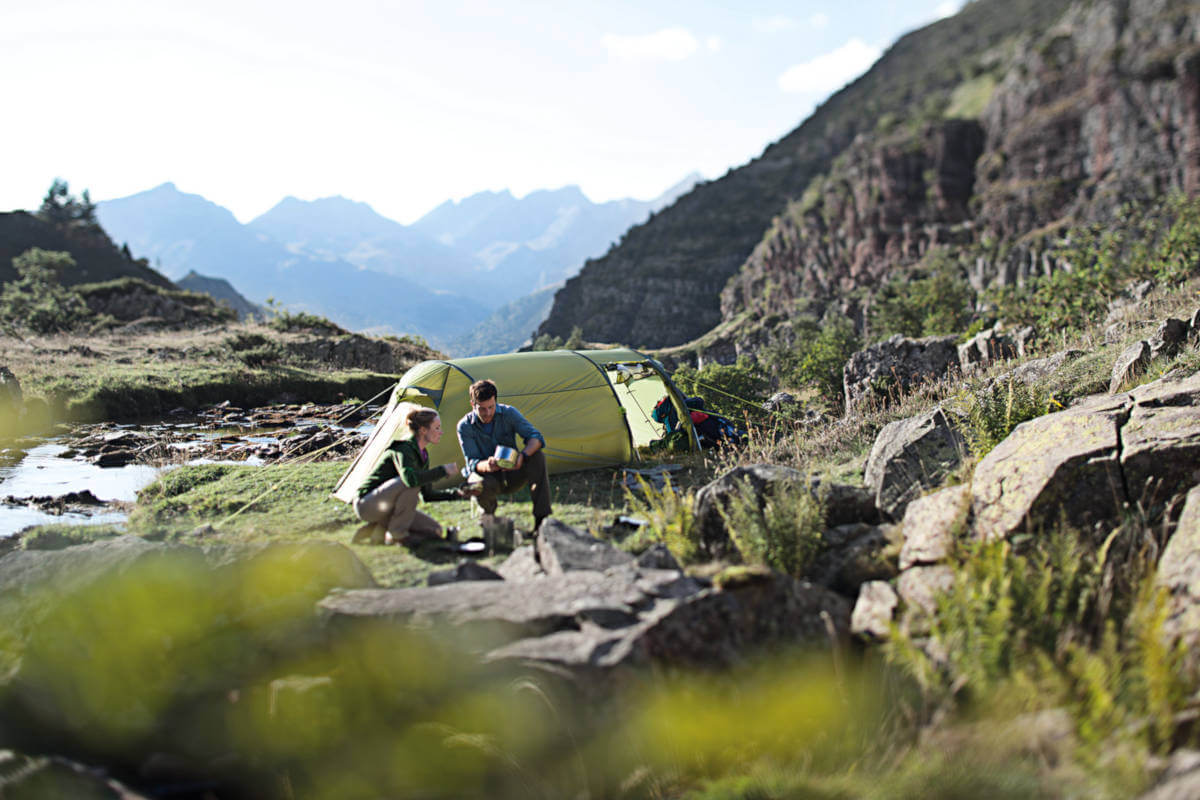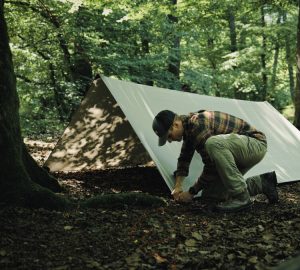Sleeping under the stars, listening to the noises of wild animals and the whispering of the wind in the treetops, woken in the morning by the first rays of sunshine – spending the night in a tent stimulates the senses. In this article, TATONKA offers you some valuable tips for an unforgettable, wonderful camping experience.
The tent: a cosy outdoor base camp
After a long hiking tour during the day you set down your backpack, take off your walking boots and enjoy a barbecue around the campfire: The evening under the stars is the cherry on top of a lovely day in the open. Just because you do not want to stay in a hotel does not mean you have to do without comfort: modern tents are real dens to feel well in and where, after a long hiking tour, you can snuggle down in your sleeping bag and enjoy the fresh night air.
With spacious sleeping cabins, apses often of standing height and additional storage space, Tatonka tents are ideal mobile outdoor base camps. Ventilation openings ensure pleasant ventilation, but the mosquitoes stay outside! Our product developers have fitted out most of our tents with an additional mosquito-safe internal tent so that at night, you can enjoy your well-earned rest without being disturbed by these stinging nuisances.
‘Green’ Camping: A very special camping enjoyment
Unauthorized camping is forbidden in Germany, but there are numerous so-called natural campsites that let the hearts of outdoor enthusiasts beat faster and provide an intense nature experience. They were established with long-term sustainability in mind: They are regarded as environmentally friendly and in harmony with nature as well as fitting in with the surrounding landscape. As a matter of course, many of these sites offer foods and meals from the region. If you’re looking for a way to enjoy the beauty of the region just outside your front door, by day and by night, on a hiking tour or camping trip, you can find lots of information online.
Off to distant parts with kit and caboodle
For those who wish to take off to distant parts with tent and hiking equipment, there are fantastic areas particularly in northern Europe for camping. Iceland for example offers fascinating scenery, but the low temperatures may put a damper on outdoor pleasure. The spectacular landscape however, more than compensates for rain, wind and freezing temperatures overnight, sometimes even in summer.
TATONKA tents: mobile feel-good dens for your Expedition Life
Tatonka tents are manufactured with top quality materials and come with many useful details: If they are used properly and with due care, they are long-lasting, reliable partners for nights in the open. The Tatonka tent manual gives you valuable tips for care and erection of your tent – and your excursion into nature will be an unforgettable experience.
What you need to know about your tent
Care and maintenance
The tent underlay protects the floor from thorns, thistles and dampness and keeps the floor material impervious for a longer time. After use, the tent should be shaken out well and, if necessary, wiped with a damp cloth. Tents should never be put in a washing machine. Ideally, the tent should be hung up or spread out to dry – condensation occurs in all weather, regardless of the place the tent has been set up or its type. Over time, the material will not withstand UV rays as they speed up the ageing process of the tent. The material becomes brittle and loses its non-tear properties. Silicon-coated outer materials are less sensitive than PU-coated.
Zips and seams
Welded seams and watertight zip fastenings are essential contributions to camping in comfort. Proper care of your tent increases its lifespan. If there is dirt in the zip fastenings, of course this is not ideal. If the tension is not correct, they may get stuck. If the zip fastener does not function immediately, a silicon spray helps. Only very few tent seams are completely watertight. If you find a leaky spot, carefully apply a thin layer of sealant to it while the tent is erected, then let it dry.
Storing in the tent bag
At the end of your tour, clean, dry and fold your tent and store it in a dry, airy space with no direct sunlight. It’s recommended to not store your tent in its storage bag. When folding your tent, to avoid abrasions or other damage you can try to fold it loosely to minimize the risk.
4 Facts about tents
Of course, every camping enthusiast wants his or her tent to be 100% dry inside, to last a lifetime and to survive many years without damage. Tatonka tents are top class quality workmanship – but it’s good to keep the following facts in mind:
Fact 1
No tent is 100% waterproof. A finished tent consists of various materials and parts. Seams, depending on the design and materials, cannot always be waterproof and water can also seep through the zips. Condensation should be allowed to exit via special openings in the tent.
Fact 2
Tents do not last a lifetime. All materials age, especially when subjected to rough weather conditions or UV rays. Tips on the best ways to deal with external influences can be found in the tent manual.
Fact 3
Even in good tents, there is still condensation dampness that simply cannot be avoided in a tent. Tips on minimizing condensation can be found in the tent manual.
Fact 4
If not handled or stored correctly or under too much pressure, even aluminium rods can break. It is therefore recommended that you always take at least one spare sheath with you when you go camping.
Note: This article was published in April 2011 and revised in March 2018.







